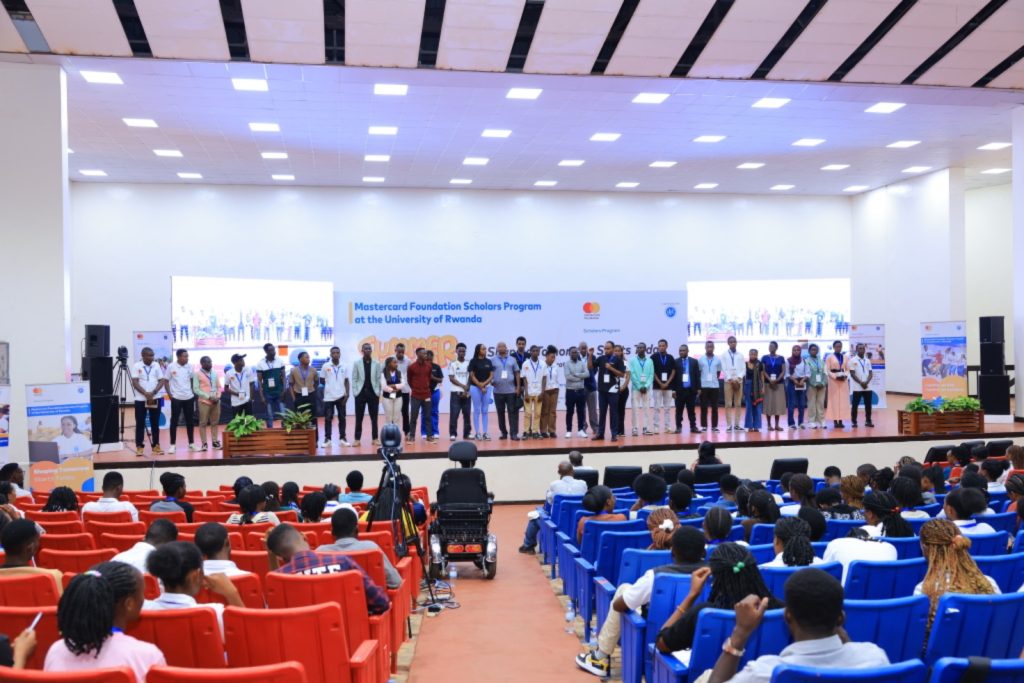Solid Minds Counselling Clinic at the University of Rwanda Mastercard Foundation Scholars Summer Camp 2025

From August 4th to 9th, 2025, the University of Rwanda’s Huye Campus was filled with energy as over 500 Mastercard Foundation Scholars from the university’s seven campuses gathered for the annual Scholars Summer Camp. Joining them were the Mastercard Foundation Scholar Program team, the university leadership that includes the student welfare office, career guidance and employability office, students guild council representatives, other university programs and key partners such as a representation from the Ministry of Education, Huye district, Kora Coach Business Academy, Bag Innovations, FAWE Rwanda, and Solid Minds Counseling), and university’s guild council representatives.
Themed “Shaping Tomorrow Starts with Today: Building the Next Generation of Transformative Leaders”, the week-long camp was a gathering of bright minds. It became a vibrant space for leadership, learning, and collective action.
This year, the spotlight turned to an often-overlooked dimension of leadership: mental health and emotional well-being. Solid Minds Counselling Clinic joined with a clear mission to support scholars in cultivating compassionate communities where mental health is acknowledged, destigmatized, and supported.
One of the highlights of the Summer Camp was the Psychological First Aid (PFA) refresher session, delivered by the Solid Minds Counselling Clinic team and 20 Scholars who had previously undergone PFA training. The refresher session was in preparation for the main workshop. The Solid Minds staff team together with selected scholars met in the evening prior to the main workshop for the previously trained scholars to collaboratively plan and refine their approach, focusing on how best they can transfer acquired knowledge to their peers during the summer camp. The team designed a student-friendly workshop plan that incorporated scenarios, role plays, and interactive discussions, ensuring participants not only understood the PFA concepts but also felt equipped to apply them in real-life situations.

Scholars during an engaging PFA refresher with role plays, scenarios, and interactive discussions to equip peers with practical skills.
To kick off the Psychological First Aid workshop, Dr. Jean Pierre Ndagijimana (JPN), Solid Minds’ Senior Regional Manager of Strategy & Partnerships, explained that PFA is “a simple, practical way to support someone in distress, by noticing their needs, listening with empathy, and connecting them to the right help.” He reminded scholars that while some had received PFA training at their campuses, not everyone could attend, making this Summer Camp workshop the perfect chance for the few trained peers to lead and share their knowledge with all the scholars gathered in the Huye Campus main auditorium.

Dr. Jean Pierre Ndagijimana (JPN), Solid Minds’ Senior Regional Manager of Strategy & Partnerships introducing PFA
Instead of Solid Minds taking center stage, scholars stepped into the role of trainers. Through role plays dramatizing real-life campus scenarios, they showed peers how to Look, Listen, and Link when a fellow student is in distress.

PFA providers role-playing the core principles of Psychological First Aid Look, Listen, and Link through engaging sketches.
The exercise brought lessons vividly to life:
- Look: Distress is not always obvious—it requires sensitivity to subtle changes.
- Listen: Empathy and presence build trust and reduce isolation.
- Link: Timely connection to the right help can prevent crises from escalating.
“What inspired me most was seeing the scholars take full ownership,” reflected Pacifique Igiraneza, a Solid Minds clinician. “They weren’t just participants; they were leaders teaching their peers that mental health is everyone’s responsibility.”
Reflecting on why the Solid Minds team supported Scholar volunteers in taking center stage to facilitate the main Psychological First Aid (PFA) workshop, Dr JPN shared:
“Our role at Solid Minds was to prepare and equip the students to be the ones offering the PFA training. We knew that if scholars themselves took the lead, the sessions would be more relatable, engaging, and impactful. The volunteers were carefully selected from all University of Rwanda campuses, and our hope is that when they return, they carry with them the confidence to continue leading such spaces. This approach builds ownership, strengthens peer-to-peer learning, and ensures sustainability. What they learned and shared here can strengthen their confidence to lead similar spaces and positively impact many more across their campuses.”
Beyond workshops,scholars were offered one-on-one guidance sessions that became private spaces to reflect and share challenges rarely voiced. Reflecting on the observed patterns from those spaces, Dr. JPN shared that some students decided to speak with counselors because they were struggling to socialize, others worried about unfair grading, relationship issues and breakups, and many carried heavy personal histories losing parents, being first-generation learners and, or facing financial and family pressures.
He shared that while some needed practical guidance on balancing academics and the challenges, others needed deeper support. In those cases, we connected them to Solid Minds, the Psychosocial Support Officer, or peer clubs, and worked with university staff and management where advocacy was needed. “For me, this was Look, Listen, and Link in action”, he added.
Peer Support Clubs: One Year of Growth
The Summer Camp offered an opportunity to reflect on the progress of peer support clubs established across all University of Rwanda campuses a year earlier.
In lively discussions, club leaders, scholars, and psychosocial supporters at the university shared achievements and challenges, showing how these initiatives are transforming student life.
Serge Irambona, deputy president of Sanga Inshuti Dreams Lead Youth Fellowship and a second-year Crop Production student at UR Busogo Campus, shared:
“Our peer support club is more than a club; it’s a family. We share our struggles, lift each other up, and find joy in simple activities like hiking or game nights. This family spirit has been a cornerstone of my mental well-being.”

Serge Irambona, deputy president of Sanga Inshuti Dreams Lead Youth Fellowship and a second-year Crop Production student at UR Busogo Campus,
Christella Ishimwe, the Psychosocial Support Office,Mastercard Foundation Scholars Program, at the University of Rwanda emphasized:
“Look, Listen, and Link are powerful skills that equip peer support members and scholars to be more empathetic, compassionate, and responsive. Scholars empowered with these skills can play a vital role in providing mental health first aid, both on campus and in their communities.”

Christella Ishimwe, the Psychosocial Support Officer, Mastercard Foundation Scholars Program at the University of Rwanda.
The integration of mental health into everyday life was further demonstrated during Umuganda, Rwanda’s monthly community service. At Mbazi Sector, scholars, Solid Minds staff, university staff, and local residents worked side by side to renovate houses..
For Solid Minds, this was deeply symbolic: community work was not only about physical labor but about belonging, purpose, and collective resilience all vital to mental well-being.
As Dr. JPN reminded participants:
“When we work together, we strengthen both our neighborhoods and our inner lives. We build stronger communities and healthier individuals.”

Deputy Director of Mastercard Foundation Scholars program addressing scholars and the community afterUmuganda
Closing with Purpose
The scamp concluded with a proud milestone: certificate awards for 100 scholars completing PFA training. Each certificate symbolized not only skills gained but also a responsibility embraced to be frontline supporters in their communities.

Scholars who took the PFA trainings got their certificates
By Odile Mugabe
A Communications and Peer-Support Coordination Intern at Solid Minds Counseling Clinic
